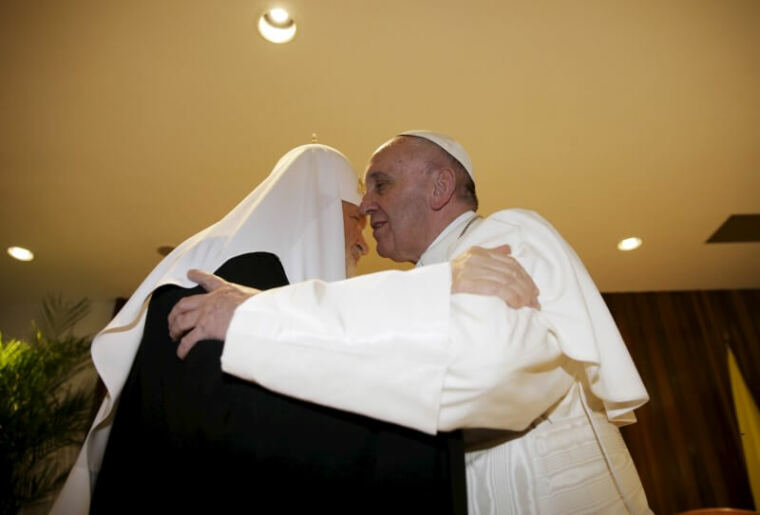Pope, Russian church leader hold historic meeting in Cuba

Pope Francis arrived in Havana on Friday to meet the head of the Russian Orthodox Church nearly 1,000 years after Eastern Orthodoxy split with Rome, marking the first encounter in history between a Roman Catholic pope and a Russian Orthodox patriarch.
The two religious leaders, guests of a Communist government, will address the millennium-long rift between the Western and Eastern branches of Christianity.
Cuban President Raul Castro and Cardinal Jaime Ortega, the church's highest representative in Cuba, greeted the pope as he got off the plane, minutes before Francis met Patriarch Kirill.
Francis, dressed in white with a skullcap, and Kirill, wearing a tall, domed hat that dangled a white stole over black robes, joined arms and kissed on both cheeks when they met inside the terminal. They then sat down for a chat with aides on either side.
They were expected to unite in an appeal for an end to persecution and killing of Christians in the Middle East.
Their meeting, announced just a week ago, also carried political overtones, coming at a time of Russian disagreements with the West over Syria and Ukraine.
The pope was scheduled to remain in Cuba for three and a half hours before continuing on to Mexico for a five-day visit.
Kirill arrived in Havana on Thursday and was also greeted by Castro, an ally of Russia who also received Francis in Cuba just five months ago.
The Argentine pontiff previously played a role in rapprochement between the United States and Cuba, which restored diplomatic relations last year after a 54-year break.
Now the pope is seeking to repair a much longer rupture. Eastern Orthodoxy split with Rome in 1054, and today the Russian church counts some 165 million of the world's 250 million Orthodox Christians.
Kirill, on a longer stay, will also visit Cuba's small Russian Orthodox Church, built between 2004 to 2008 and attended by Russian holdovers from the decades of Soviet influence in Cuba.
Russian President Vladimir Putin has supported the Russian church, which in turn has backed Kremlin foreign policy, most notably in Ukraine and the Middle East.
Putin has also improved relations with Cuba, which were strained following the collapse of the Soviet Union in 1991.
 Christians don't have to affirm transgenderism, but they can’t express that view at work: tribunal
Christians don't have to affirm transgenderism, but they can’t express that view at work: tribunal Archaeology discovery: Medieval Christian prayer beads found on Holy Island
Archaeology discovery: Medieval Christian prayer beads found on Holy Island Presbyterian Church in America votes to leave National Association of Evangelicals
Presbyterian Church in America votes to leave National Association of Evangelicals Over 50 killed in 'vile and satanic' attack at Nigerian church on Pentecost Sunday
Over 50 killed in 'vile and satanic' attack at Nigerian church on Pentecost Sunday Ukrainian Orthodox Church severs ties with Moscow over Patriarch Kirill's support for Putin's war
Ukrainian Orthodox Church severs ties with Moscow over Patriarch Kirill's support for Putin's war Islamic State kills 20 Nigerian Christians as revenge for US airstrike
Islamic State kills 20 Nigerian Christians as revenge for US airstrike Man who served 33 years in prison for murder leads inmates to Christ
Man who served 33 years in prison for murder leads inmates to Christ


 Nigerian student beaten to death, body burned over ‘blasphemous’ WhatsApp message
Nigerian student beaten to death, body burned over ‘blasphemous’ WhatsApp message 'A new low': World reacts after Hong Kong arrests 90-year-old Cardinal Joseph Zen
'A new low': World reacts after Hong Kong arrests 90-year-old Cardinal Joseph Zen Iran sentences Christian man to 10 years in prison for hosting house church worship gathering
Iran sentences Christian man to 10 years in prison for hosting house church worship gathering French Guyana: Pastor shot dead, church set on fire after meeting delegation of Evangelicals
French Guyana: Pastor shot dead, church set on fire after meeting delegation of Evangelicals ‘Talking Jesus’ report finds only 6% of UK adults identify as practicing Christians
‘Talking Jesus’ report finds only 6% of UK adults identify as practicing Christians Mission Eurasia ministry center blown up in Ukraine, hundreds of Bibles destroyed: 'God will provide'
Mission Eurasia ministry center blown up in Ukraine, hundreds of Bibles destroyed: 'God will provide' Church holds service for first time after ISIS desecrated it 8 years ago
Church holds service for first time after ISIS desecrated it 8 years ago Burger King apologizes for 'offensive campaign' using Jesus' words at the Last Supper
Burger King apologizes for 'offensive campaign' using Jesus' words at the Last Supper Uganda: Muslims abduct teacher, burn him inside mosque for praying in Christ’s name
Uganda: Muslims abduct teacher, burn him inside mosque for praying in Christ’s name